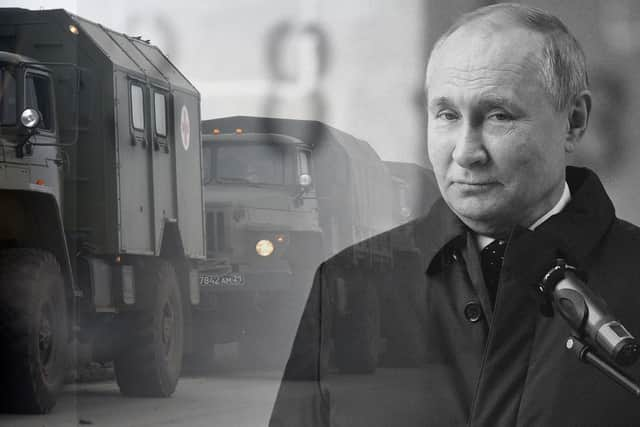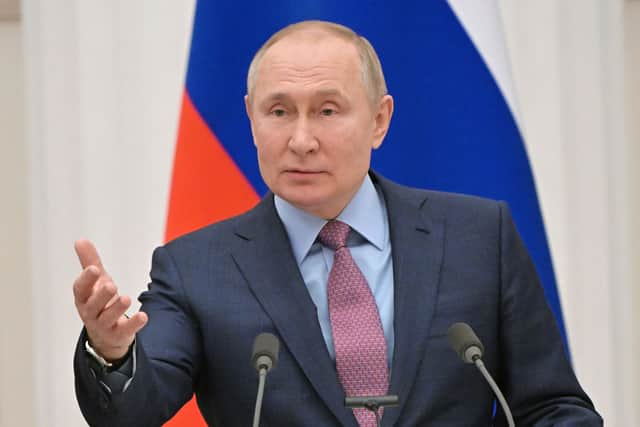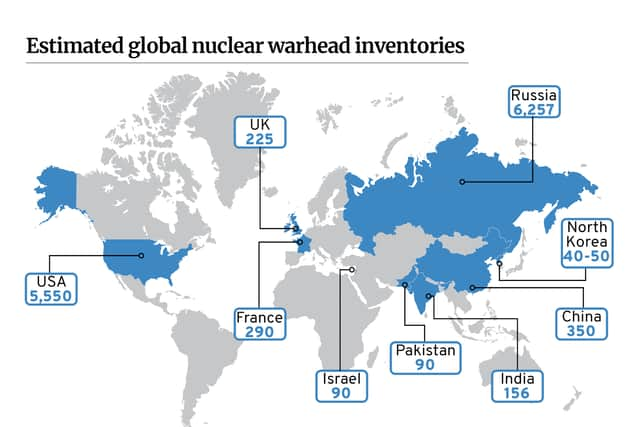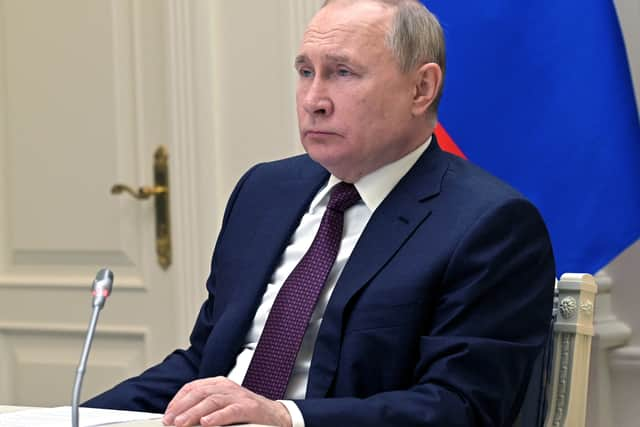What makes Putin tick? Political scientist on how he makes decisions and if he would start a nuclear war
This article contains affiliate links. We may earn a small commission on items purchased through this article, but that does not affect our editorial judgement.
and live on Freeview channel 276
Vladimir Putin has been the Russian leader for nearly 22 years. He has long been a controversial figure, but he has now become a pariah in the eyes of the west, following his order to invade neighbouring Ukraine.
The Russia-Ukraine conflict has already seen Ukrainian civilians and Russian troops killed, thousands across the world protesting against the war, and severe economic sanctions imposed on Russia by Western nations.
Advertisement
Hide AdAdvertisement
Hide AdAll eyes are on the Russian President with fears of what he might do next and how far he will go.
NationalWorld spoke to Matt Qvortrup, a political scientist from Coventry University, to understand more about Vladimir Putin.
What makes him tick, how does he make decisions, could he conceivably start a nuclear war and what can we expect over the coming days?


What makes Vladimir Putin tick?
Taking a look back at Putin’s past and his background can help us to understand the man today.
Advertisement
Hide AdAdvertisement
Hide AdHe was a KGB officer before entering Russian politics - the KGB was the Soviet Union’s main intelligence and security agency until it was dissolved in 1991.
“When he did his KGB training somebody mentioned his height - he didn’t take kindly to that and decided to get into a fight with this much larger man,” Professor Qvortrup said of Putin, who is 170cm tall.
He added: “He was beaten up and had to go to hospital. Putin had a broken arm.”
“As a result of all of this he was not sent to West Germany as a spy, he got an office job at the KGB in East Germany and it took him 10 years to be promoted from first lieutenant to captain.”
Advertisement
Hide AdAdvertisement
Hide AdAn event from his past such as goes some way to explaining his seemingly erratic decision making process today.
Professor Qvortrup said: “What makes him tick is a lot of vanity. He is a hot head, somebody who does not think ahead before he acts and sometimes has overestimated his own strengths.”
“We think he was someone who was bullied at school - we’ve got reports from his primary school teacher.”
He added: “Putin is of the same mindset as Franco was in Spain.
“He is vainglorious, cocky and a risk taker.”
Advertisement
Hide AdAdvertisement
Hide Ad

What will Putin’s next move be? Would he press the nuclear button?
Putin has been compared to the likes of previous dictators Adolf Hitler of Germany and the aforementioned Francisco Franco of Spain, making the world fearful of what he might do next and the lengths he could go to.
Professor Qvortrup said: “The fact that the war hasn’t gone to plan will mean that he will ramp that up.
“He is somebody who has no incentive in going backwards, he needs to show strength.”
The Crimea War in 2014 was markedly different, in comparison to the current invasion of Ukraine, according to Professor Qvortrup.
Advertisement
Hide AdAdvertisement
Hide Ad“When he marched into Crimea in 2014 not a single Russian died, it was a swift operation and popular,” he said.
“He was seen there as a liberator, popular at home. This one is very different - it is not a popular war.”
When asked if Putin could start a nuclear war, Professor Qvortrup replied: “I fear that he probably would.
“He is a person that thinks about himself, he thinks about how he can look good and it is not inconceivable that he would go to that length just out of vanity.”
Advertisement
Hide AdAdvertisement
Hide AdUkraine gave up its nuclear weapons in 1994, putting the country in a highly vulnerable position.


“It is not inconceivable that he might send a missile that way,” Professor Qvortrup said.
He added: “There is also the possibility that he would attack Western Europe and if he were to do that he doesn’t have the missiles to hit America.
“So it would probably be Britain and France if he were to do that but I think the risk of that is very limited.”
Advertisement
Hide AdAdvertisement
Hide AdHow does Putin make decisions?
His decisions are largely based on the people within his inner circle.
Analysts believe Mr Putin is at the centre of a shrinking inner circle consisting of people helping him believe he is in control of the situation.


Most of the security men around Putin rose up through the ranks of the KGB, with none having military or diplomatic experience - therefore little knowledge of Ukraine.
“The problem with all dictatorships is that you have an information underload and you are not quite aware of how things are in the real world,” Professor Qvortrup said.
Advertisement
Hide AdAdvertisement
Hide Ad“He has a bunker mentality and does not have excellent advisors around him. This means he gets a distorted image of the world.”
Putin insists that his briefings are kept to three pages and written in font 18.
“You can’t really get a lot of detail in three pages”, Professor Qvortrup said.
What can we expect to happen next?
The fighting escalated on Monday (28 February,) with missiles killing dozens of civilians in Kharkiv, Ukraine’s second city.
Advertisement
Hide AdAdvertisement
Hide AdOn Tuesday (1 March), Ukraine said 5,700 Russian troops have been killed so far.
According to Boris Johnson the Russian president has "fatally underestimated" the willingness of the Ukrainian people to fight and the resolve of the West.
Professor Qvortrup said it is more than likely that the Russians will eventually prevail after a battle with huge losses on both sides. But there will be huge repercussions and even bigger problems.
Professor Qvortrup said: “You cannot occupy a country that hates you.”
Advertisement
Hide AdAdvertisement
Hide AdAccording to the U.S. ambassador to the United Nations, a full-scale Russian invasion of Ukraine would create one of the largest refugee crises in the world with as many as five million people displaced.
Professor Qvortrup added: “In the next few days the Russians are going to go all in.
“We are in a situation where it is going to get much worse.”
A message from the editor:
Thank you for reading. NationalWorld is a new national news brand, produced by a team of journalists, editors, video producers and designers who live and work across the UK. Find out more about who’s who in the team, and our editorial values. We want to start a community among our readers, so please follow us on Facebook, Twitter and Instagram, and keep the conversation going. You can also sign up to our newsletters and get a curated selection of our best reads to your inbox every day.
Comment Guidelines
National World encourages reader discussion on our stories. User feedback, insights and back-and-forth exchanges add a rich layer of context to reporting. Please review our Community Guidelines before commenting.
